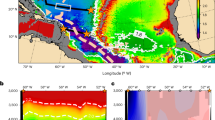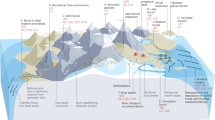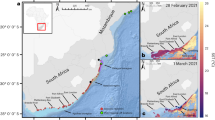Abstract
MAJOR rivers are important for an understanding of the overall balance of dissolved and particulate matter carried to the ocean1,2. Although Livingstone3 gives a large amount of information on the world surface waters, there is still a lack of data on many important rivers, especially from South-east Asia. These rivers are generally presumed to contribute a great part to the continental and particulate balance1,3,4, but are poorly documented except for the work of Kobayashi in Thailand5 and a few analyses performed for the International Association of Scientific Hydrology6. The Mekong river is one of the biggest in this region7,8 (Table 1). We have previously studied the hydrology of the Tonle Sap-Mekong system9 and the influence of the Mekong river on Cambodia Grand Lac water chemistry10. Here we deal with analyses performed at Phnom Penh (Fig. 1).
This is a preview of subscription content, access via your institution
Access options
Subscribe to this journal
Receive 51 print issues and online access
$199.00 per year
only $3.90 per issue
Buy this article
- Purchase on Springer Link
- Instant access to full article PDF
Prices may be subject to local taxes which are calculated during checkout
Similar content being viewed by others
References
Alekin, O. A.,and Brazhnikova, L. V., Gidrokhim. Mater., 32, 12–24 (1960).
Gibbs, R. J., Geol. Soc. Am. Bull., 78, 1203–1232 (1967).
Livingstone, D. A., US Geol. Survey Prof. Paper, 440 G, G1–G64 (1963).
Holeman, J. N., Water Resources Res., 4, 737–747 (1968).
Kobayashi, J., Ber. Ohara Inst. landw. Biol., 11, 167–233 (1959).
Durum, W. H., Heidel, S. G., and Tison, L. J., Int. Ass. Sci. Hydrol. publs., 51, 618–628 (1960).
United Nations, ECAFE, Water Resources Series, No.29 (1968).
United Nations, ECAFE, CCILMRB, Lower Mekong Hydrologic Yearbooks Bangkok (1962–66).
Carbonnel, J. P., Int. Ass. Sci. Hydrol. publs., 70, 481–488 (1966).
Carbonnel, J. P., Revue Géogr. phys. Géol. dyn., 8, 151–160 (1966).
UNESCO, Hydrology, Studies and Reports in, I, II, III (1969–1971).
Raymahashay, B. C., in Proc. Symp. Hydrogeochem. Biogeochem., 82–92 (edit. by Clarke, C., Washington), (Tokyo, 1973).
Alekin, O. A., and Brazhnikova, L. V., Int. Ass. Sci. Hydrol., publs., 78, 35–41 (1968).
Gibbs, R. J., Geochim. cosmochim. Acta, 36, 1061–1066 (1972).
Leifeste, D. K., US Geol. Survey Circ., 685 (1974).
Liepolt, R., Limnologie der Donau. Schweizerbarte'che (Verlagbuchhandlung, Stuttgart, 1967).
Levinson, A. A., et al., Geochim. cosmochim. Acta, 33, 133–137 (1969).
Bonetto, A., et al., Verh. Int. Verein theor. angew, Limnol, 17, 1035–1050 (1969).
Symoens, J. J., Exploration hydrobiologique du bassin du lac Bangweolo et du Luapula, II, (Brussels, 1968).
Gibbs, R. J., in Encyclopedia of Geochemistry (edit. by Fairbridge, R.), (Rheinhold, New York, 1972).
Author information
Authors and Affiliations
Rights and permissions
About this article
Cite this article
MEYBECK, M., CARBONNEL, J. Chemical transport by the Mekong river. Nature 255, 134–136 (1975). https://doi.org/10.1038/255134a0
Received:
Accepted:
Issue Date:
DOI: https://doi.org/10.1038/255134a0
This article is cited by
-
Changing fluxes of carbon and other solutes from the Mekong River
Scientific Reports (2015)
-
Monsoon-induced upwelling off the Vietnamese coast
Ocean Dynamics (2007)
-
Major ion chemistry of some large Chinese rivers
Nature (1982)
-
Biological export of shelf carbon is a sink of the global CO2 cycle
Nature (1981)
-
Rates of chemical denudation of silicate rocks in tropical catchments
Nature (1978)
Comments
By submitting a comment you agree to abide by our Terms and Community Guidelines. If you find something abusive or that does not comply with our terms or guidelines please flag it as inappropriate.



